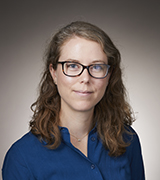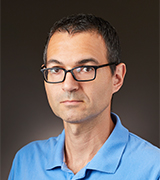Alumni Newsletter September 2018
New faculty join Western Economics
We welcome Amanda Michaud and Juan Carlos Hatchondo to Western Economics. Amanda joined Western Economics as an Associate Professor on July 1, 2018, from Indiana University. Juan Carlos Hatchondo, also from Indiana University, will start as Professor on January 1, 2019. Recently they both answered a series of questions for this faculty profile about their research, teaching and move to Western.
Amanda Michaud
1. What areas of economics do you specialize in?
I am a Macroeconomist. My research covers topics in International and Labor economics.
2. What are the practical implications of your work?
Several areas of my research hold implications for how we think about policy. For example, my work on disability highlights that individuals' health risks are substantially impacted by the type of work they do over their lifetime. My coauthor and I establish a surprising implication of this fact. Even individuals who expect to never be disabled benefit from paying into Social Disability programs because the presence of this insurance makes the cost of labor in hard, physical occupations cheaper. Then goods produced by this type of labor such as mining, construction, and transportation are cheaper for all individuals. We are now researching the implications of the fact that health and economic risks are highly correlated within occupations: work that is hard on the body is also in decline. This gives us new understanding of the importance of Social Disability programs for insurance and its impact on inequality.
3. What are your first impressions of Western and London?
The culture at Western is well known within the profession for collegiality and a shared passion for rigorous economics. My first impressions of the department confirmed this. I'm excited to be teaching and conducting my research in such an energetic environment.
4. When you are not working, what do you do?
I am an avid runner. I ran over 4,000 km in 2017!
5. What's the best piece of advice you have ever received?
"Be more ambitious." My first attempt at research was literature driven: extending existing knowledge to the next step because that is what I thought one was supposed to do. This piece of advice unleashed me to use Economics in innovative ways to answer new questions or approach old questions radically differently. It also gave me the permission to sometimes have projects fail or move slowly, so long as I was aiming high.
6. So far, who has had the greatest influence on your education and the start of your career path?
The culture in Macroeconomics has a reputation of being brutally critical, but at its best this criticism is constructive and intended to drive the field forward. I would say that the economists that take the time to attend a talk or read a paper and provide their thoughts are the ones that keep me striving to raise the bar higher. This could be colleagues, advisers, or strangers in my fields; but is particularly true of my classmates. There was a lot of positive peer pressure in my PhD cohort in Minnesota to work hard and be rigorous and this ethos continues to this day. Everybody is serious about what they do, but also incredibly passionate. It makes you feel like you are part of something much larger than yourself.
Juan Carlos Hatchondo
1. What areas of economics do you specialize in?
I have focused most of my research on the study of sovereign debt markets under the presence of default risk. I have also worked on consumer credit.
2. What are the practical implications of your work?
Sovereign debt crises tend to be socially costly. My research may help evaluate the merits of policies aimed at reducing the frequency of those crises.
3. What are your first impressions of Western and London?
Western econ struck me as a place where people are as serious about research as maintaining a high degree of collegiality. Regarding London, there was a snow storm shortly after I arrived for the first time (April). But I did my graduate studies in Rochester, NY, so lake-effect snow isn't new to me.
4. When you are not working, what do you do?
I like to play soccer once a week and visit the gym regularly, where I usually watch political documentaries. I also enjoy an occasional movie and a few book pages before going to sleep.
5. What's the best piece of advice you have ever received?
Keep working.
6. So far, who has had the greatest influence on your education and the start of your career path?
I've learned a great deal from my adviser in graduate school (and afterwards), classmates, and colleagues in my first job.
Return to the Economics Alumni Newsletter on the web.

